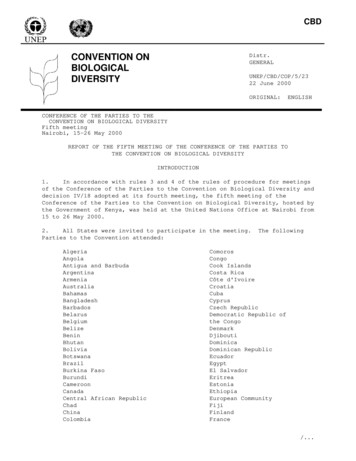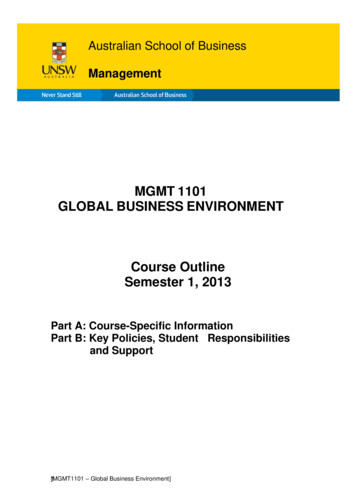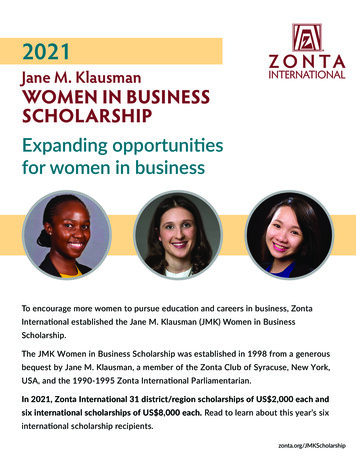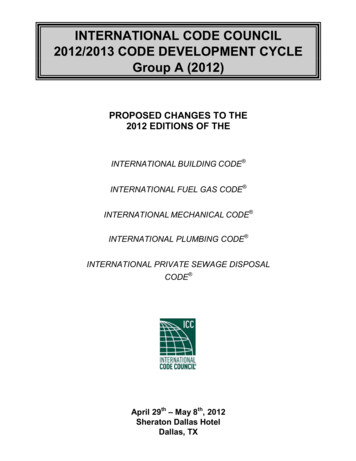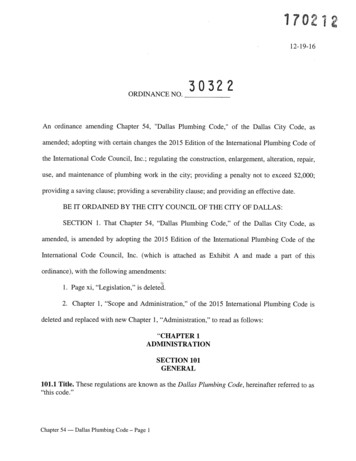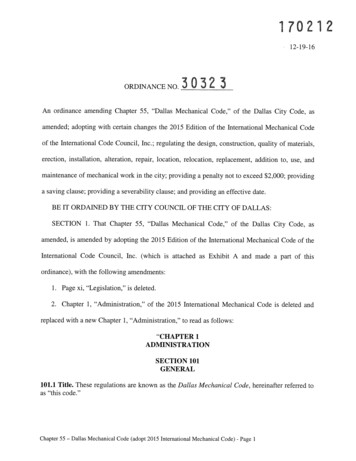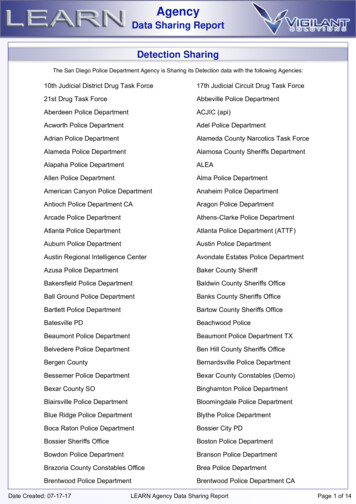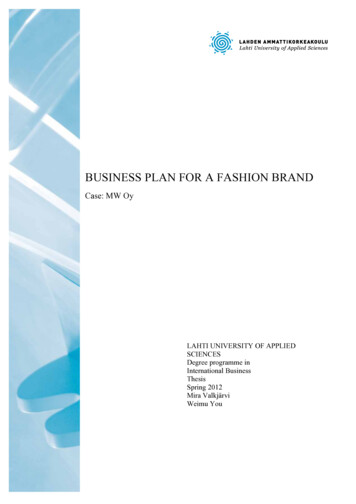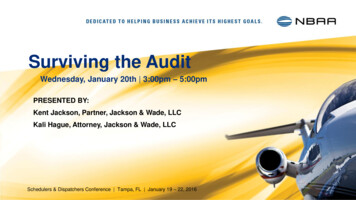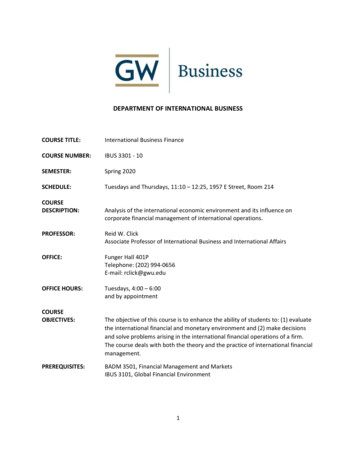
Transcription
DEPARTMENT OF INTERNATIONAL BUSINESSCOURSE TITLE:International Business FinanceCOURSE NUMBER:IBUS 3301 - 10SEMESTER:Spring 2020SCHEDULE:Tuesdays and Thursdays, 11:10 – 12:25, 1957 E Street, Room 214COURSEDESCRIPTION:Analysis of the international economic environment and its influence oncorporate financial management of international operations.PROFESSOR:Reid W. ClickAssociate Professor of International Business and International AffairsOFFICE:Funger Hall 401PTelephone: (202) 994-0656E-mail: rclick@gwu.eduOFFICE HOURS:Tuesdays, 4:00 – 6:00and by appointmentCOURSEOBJECTIVES:PREREQUISITES:The objective of this course is to enhance the ability of students to: (1) evaluatethe international financial and monetary environment and (2) make decisionsand solve problems arising in the international financial operations of a firm.The course deals with both the theory and the practice of international financialmanagement.BADM 3501, Financial Management and MarketsIBUS 3101, Global Financial Environment1
COURSEMATERIALS:The textbook for the course is:Madura, International Financial Management, 13th Edition, Cengage Learning,2017.There is also a packet of 4 cases available from Harvard Business School. Thefour cases are: Voyages Soleil Molto Delizioso Foreign Exchange Hedging Strategies at GM: Competitive Exposures Samoa TalaThe packet is available at: https://hbsp.harvard.edu/import/688009You also need to read a business newspaper such as The Wall Street Journal orThe Financial Times to keep up with current international business events. TheWall Street Journal offers more depth to coverage, and that’s what I read. Asubscription to The Wall Street Journal is affordable with student prices and isavailable in print and digital editions. The print version will be delivered six daysper week (Monday through Saturday) and the digital version is updatedcontinuously. Information on student subscriptions is available athttp://r.wsj.net/nQPqM. A print-and-digital version is available for 10 permonth, and the digital-only version is available for 4 per month.You will also need a simple calculator, particularly for use on the exams. It doesnot need to be a financial calculator or programmable, but something that willrelieve you from doing addition, subtraction, multiplication and division byhand. You will not be allowed to use cellular phones for this purpose during theexam.There will also be occasional handouts passed out in class or posted onBlackboard at blackboard.gwu.edu.2
EVALUATION:In accordance with University regulations, each student will receive a grade of A,B, C, D, or F (with or – as appropriate). Grades will be based on three exams,four case memoranda (prepared in teams) and class performance, according tothe following point scale (and weights):EXAM 1EXAM 2EXAM 3TEAM CASE MEMORANDA (4)CLASS PERFORMANCETOTAL100 POINTS100 POINTS100 POINTS60 POINTS40 POINTS400 POINTS25%25%25%15%10%100%The exams will cover material contained in the lectures, class discussions, andassigned readings (including handouts). Make-up exams for missed exams willbe given only in extreme emergencies, so you must plan to take the exams atthe stated dates and times.For the cases, students are required to work in teams (of approximately 3people) to write short and concise executive summaries (approximately 2 pages,but depending on the case, and possibly with exhibits attached) of theirrecommendations pertaining to the case. Questions for the cases will behanded out in advance. The cases will also be discussed in class.Class performance will be assessed on attendance, contribution to classdiscussions, and responses to questions asked in class.For both exams and class discussion, you must keep up with current events ininternational business finance.Although not graded, you are encouraged to work Self-Test Questions andproblems at the end of each assigned chapter in order to prepare for the exams.As part of the class assignments, some specific questions from each chapter arerecommended. Answers to the Self-Test Questions are in Appendix A of thetextbook. Answers to the recommended Questions and Applications will beposted on Blackboard.3
SCHEDULE OF CLASSESPART 1: EXCHANGE RATESDATETuesday, January 14TOPICIntroductionInternational Financial FlowsThursday, January 16International FinancialMarketsTuesday, January 21Elements of Exchange RateDeterminationThursday, January 23Currency DerivativesTuesday, January 28Interest Rate ParityThursday, January 30Inflation, Interest Rates, andExchange RatesTuesday, February 4Discussion of IntegrativeProblems #1 and #2EXAM 1Thursday, February 64ASSIGNMENTChapter 2Self-Test Question #1Questions and Applications#9, #12, #13Chapter 3Self-Test Questions #1, #3Questions and Applications#3, #4, #10, #11, #23, #25Chapter 4Self-Test Questions #2, #3Questions and Applications#1, #4, #22, #25Chapter 5Self-Test Question #4Questions and Applications#4, #6, #14, #16, #17, #23Chapter 7Self-Test Questions #1, #2,#3, #5Questions and Applications#17, #21, #31, #35Chapter 8Self-Test Questions #4, #5, #6Questions and Applications#19, #20, #24, #25, #26
PART 2: FOREIGN EXCHANGE EXPOSURE AND MANAGEMENTDATETuesday, February 11TOPICExchange Rate ExposureThursday, February 13Exchange Rate ExposureContinuedMolto Delizioso CaseDiscussionHedging TransactionExposureTuesday, February 18Thursday, February 20Tuesday, February 25Thursday, February 27Tuesday, March 3Thursday, March 5Tuesday, March 10Thursday, March 12Tuesday, March 17Thursday March 19Voyages Soleil CaseDiscussionManaging EconomicExposureForeign Exchange HedgingStrategies at GM:Competitive ExposuresCase Set-UpTeam Work on CaseFinal Case DiscussionDiscussion of IntegrativeProblem #3EXAM 2SPRING BREAK5ASSIGNMENTChapter 10 IntroducedSelf-Test Questions #2, #3, #4Questions and Applications#2, #21, #27, #44,#45 with σ 2.9Chapter 10 ContinuedHand in Case MemorandumChapter 11Self-Test Questions #1, #2,#3, #4, #5, #6Questions and Applications#7, #11, #12, #19, #27, #39Hand in Case MemorandumChapter 12Self-Test Questions #1, #2Questions and Applications#9, #11, #12Read Case and CaseQuestionsHand in Case MemorandumCorrection in IntegrativeProblem #3: On page 412 inthe first table, Canadiandollar Total Outflow shouldbe C 2,000,000.NO CLASSES
PART 3: CROSS-BORDER INVESTMENTDATETuesday, March 24TOPICDirect Foreign InvestmentInternational CapitalBudgeting: BasicsThursday, March 26International CapitalBudgeting: ExtensionsTuesday, March 31Country Risk AnalysisThursday, April 2International Cost of Capitaland Capital Structure:PreliminariesTuesday, April 7International Cost of Capitaland Capital Structure:OptimizationLong-Term FinancingThursday, April 9Tuesday, April 14Thursday, April 16Tuesday, April 21Thursday, April 23Discussion of IntegrativeProblem #4EXAM 3Samoa Tala Case Set-UpSamoa Tala Case Discussion6ASSIGNMENTChapter 13Self-Test Questions #1, #2Questions and Applications#6, #10, #18Chapter 14 IntroducedChapter 14 ContinuedSelf-Test Questions #3, #4, #5Questions and Applications#16, #20, #29Chapter 16Self-Test Question #5Questions and Applications#22, #25, #27Chapter 17 IntroducedSelf-Test Questions #1, #2,#4, #5Questions and Applications#12, #13, #14, #22,#23 with additional questionsChapter 17 ContinuedChapter 18Self-Test Questions #2, #3Questions and Applications#6, #11Hand in Case Memorandum
1 . DEPARTMENT OF INTERNATIONAL BUSINESS . COURSE TITLE: International Business Finance COURSE NUMBER: IBUS 3301 - 10 SEMESTER: Spring 2020 SCHEDULE: Tuesdays and Thursdays, 11:10 - 12:25, 1957 E Street, Room 214 COURSE . DESCRIPTION: Analysis of the international economic environment and its influence on corporate financial management of international operations.
